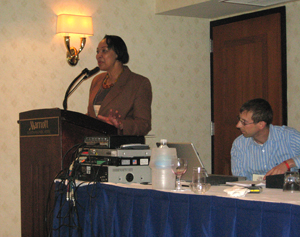 We
had a wonderful gathering in remembrance of Elliott
P. Skinner in Washington, D.C. at the AAA Annual Meetings.
Thank you to all who joined us. Gwendolyn Mikell presented
a retrospective of Elliott P. Skinner’s life and
career accompanied by a stunning slideshow prepared
by J.R. Osborn. Following the formal presentation, commemorative
comments were made by AfAA Board members and Elliot
Skinner’s colleagues and former students. The
comments emphasized Professor Skinner’s scholarly
prowess and intellectual generosity over the years.
Nancy Schwartz also presented a moving memorial statement
on Eugenia Shanklin. The reception and presentations
received kudos from the audience and many AAA members
both within and outside our association. The reception
was extremely well attended with a capacity audience.
AfAA members sporting our new wristbands contributed
to the enthusiasm of this event. We
had a wonderful gathering in remembrance of Elliott
P. Skinner in Washington, D.C. at the AAA Annual Meetings.
Thank you to all who joined us. Gwendolyn Mikell presented
a retrospective of Elliott P. Skinner’s life and
career accompanied by a stunning slideshow prepared
by J.R. Osborn. Following the formal presentation, commemorative
comments were made by AfAA Board members and Elliot
Skinner’s colleagues and former students. The
comments emphasized Professor Skinner’s scholarly
prowess and intellectual generosity over the years.
Nancy Schwartz also presented a moving memorial statement
on Eugenia Shanklin. The reception and presentations
received kudos from the audience and many AAA members
both within and outside our association. The reception
was extremely well attended with a capacity audience.
AfAA members sporting our new wristbands contributed
to the enthusiasm of this event.
The
AfAA Distinguished Lectures of Bogumil Jewsiewicki in
2006 and Gwendolyn Mikell in 2007 will be considered
for publication by the AfAA. The Publications Committee
consists of Gwendolyn Mikell, Betty Harris, Jennifer
Coffman, and Bennetta Jules-Rosette.
In
the AfAA Business Meeting, we discussed planning of
our new awards and the scheduling of future events.
Board committees were also discussed and finalized.
To continue honoring Professor Skinner’s legacy,
please consider nominating and/or applying for any of
the following awards. Inaugural book and student paper
awards will be presented at the 2008 AAA meetings in
San Francisco (19-23 November, 2008)
Elliott
P. Skinner Book Award: This prize will
be awarded annually to the book that best furthers
both the global community of Africanist scholars and
the wider interests of the African continent as exemplified
in the work of Elliott P. Skinner. Special consideration
will be given to works drawing upon extensive research
in the field or those advancing new methodologies
for fieldwork in Africa. Submissions should be sent
to Betty Harris (bharris[@]ou.edu) or to Bennetta
Jules-Rosette (bjulesro[@]ucsd.edu)
AfAA
Graduate Student Paper Award: This prize
will be awarded to the best graduate student paper
in Africanist anthropology. Special consideration
will be given to works highlighting emerging perspectives
or demonstrating promise to develop a major contribution
in the fields of Africanist anthropology, African
studies, or African diaspora studies. Submissions
should be sent to David Turkon (dturkon[@]ithaca.edu).
AfAA
Undergraduate Paper Award: This prize
will be awarded to the best undergraduate paper in
Africanist anthropology. Submissions should be sent
to Nancy Schwartz (nancy.schwartz[@]csn.edu).
Contributions
from all subfields of anthropology are welcome for
each award. ALL AWARD NOMINATIONS ARE DUE
BY 15 MAY 2008.
Recap
of AfAA Panels
The
AfAA sponsored Presidential Session on “Africa
Unbound: Trajectories of Equality, Inequality and Social
Justice in Post-Colonial Africa” was very successful.
The papers covered issues of inequality of social justice
in Africa, including case studies from Kenya, Malawi,
Nigeria, and Tanzania.
Invited
AfAA Panels also included a panel on “Signifiers
of Social Inequality and Narratives of Inclusion in
Comparative Perspective” organized by Bennetta
Jules-Rosette and J.R. Osborn. Panelists addressed the
ways in which expressive and visual culture represent
social inequalities. This was a lively panel highlighted
in particular by discussions of Hollywood’s Africa
and popular culture in South Africa, bookended by presentations
on social inequality in Black France and Arabic practices
of writing.
Hudita
Mustafa and Ben Soares organized a panel entitled “Value
and Historical Imagination: Making Markets and Publics
in Contemporary Africa,” in which they discussed
lifestyles and markets for African cultural products.
The panelists showed that in contemporary Africa, deepening
socioeconomic instability and polarization generate
more, not less, ways of creating, distributing, and
interpreting wealth, and therefore present a fertile
and important moment for evaluating patterns of equality
and exchange.
David
Turkon participated in a panel on “Contesting
Inequalities and Changing Models of Citizenship: Ethnographic
and Theoretical Encounters with HIV/AIDS.”
(Photo
courtesy of Bennetta Jules-Rosette)
|
